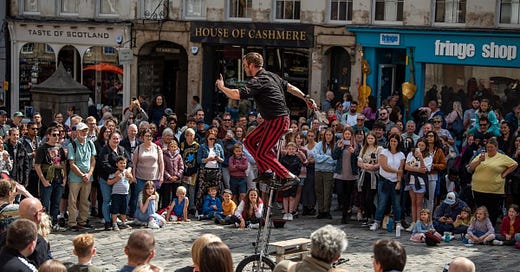What do this year's Edinburgh festivals have in store?
Some updates on the Fringe Society, Summerhall and Edinburgh International Festival, plus the reviews of Wild Rose and Clueless, and lots more links to click. All in today's Shouts And Murmurs.
Hello, and welcome to Shouts And Murmurs, a weekly email mostly for paid supporters of The Crush Bar, written by me, Fergus Morgan.
Every Tuesday, I round up the best theatre writing elsewhere - news, reviews, interviews, opinions - plus any other interesting or inspiring theatre stuff I find.
At the moment, you can only read the top bit for free, but have to become a paid supporter of The Crush Bar - it is just £5/month or £50/year - to access the good stuff below the paywall.
Thanks for reading The Crush Bar. If you want to do me a favour, then you can share this newsletter far and wide and encourage others to subscribe via the button below.
Previously in The Crush Bar:
Something terrifying happened to me the other day. A press release about an Edinburgh Fringe show landed in my inbox.
I felt like the hero - yes, that’s right, the hero - of a disaster film, noticing the first breath of the hurricane, the first ripple of the tsunami, the first twitching of the monster. Soon, I will be hurrying down the corridors of Holyrood at the elbow of a striding Angus Robertson, a sheaf of papers in my hand, trying to convince him to take the threat of the biggest ever edition of the world’s largest arts festival seriously. “Sir - Angus! - you have to listen to me! We are looking at over 5000 different events! The critics simply cannot cope with that number of self-pitying solo shows!”
Will Robertson take me seriously? The Scottish government has been reluctant to do anything to ease the myriad issues or take advantage of the unique opportunities that come with an event that sells nearly three million tickets arriving in a city of half a million people in recent years, something that has somewhat irked Shona McCarthy, outgoing chief executive of the Edinburgh Festival Fringe Society. Last week, though, it was announced that it had found £300,000 from somewhere, and would give it to the Fringe Society so it can “develop the capabilities of the Society’s data and digital infrastructure “ and “fund work to explore how the Scottish government and the Fringe Society can help Scottish artists and the sector as a whole capitalise on international opportunities, by targeting agreed priority countries and regions.”
Now, I don’t know what any of that actually means, but I do know that £300,000 sounds like a lot of money but isn’t really. It is an amount that would be life-changing if you won it on a gameshow, but that a major arts organisation burns through very quickly. It is also not the sustained core funding that McCarthy has been campaigning for ever since her organisation was cut from Creative Scotland’s portfolio in 2018. And, before you say anything, obviously I also know that the Fringe Society has got funding for other stuff from other sources, and that the Fringe Society and the festival itself are not synonymous. Perhaps that £300,000 is significant less for what it will immediately achieve and more for what it represents, though: a rapprochement between the Fringe Society and the powers that be, a hint that there might be more on the way, and a gesture to say that the Scottish government is taking this seriously.
In that respect, I would chalk it up as a win for McCarthy, who recently stepped down after nine years - and gave me this exit interview, in which she was in a very front-page-of-a-Clarkson-collection, another-thing-that-pisses-me-off mood - to be succeeded by former Riverside Studios boss Tony Lankester. McCarthy and her erstwhile organisation have their critics - she likened the Fringe Society to a piñata battered from all sides in that interview - but I genuinely think she has done a decent job in extremely difficult circumstances. She has not solved the interlinked, intractable problems of the festival - like the cost of participating and the accommodation crisis - but she has introduced ideas that might soon evolve into solutions, like the Keep It Fringe Fund and the “festival village” at Queen Margaret University. I am particularly interested in her idea that successful “Fringe alumni” - the Phoebe Waller-Bridges and Francesca Moodys of the industry - can be tapped up to support emerging artists. I would like to see the Fringe Society run with that idea. Big producers and big studios have built lucrative empires off the back of talent that took its first steps at the Fringe. Couldn’t they cough up to keep it going, too?
Let’s hope Lankester can take those ideas further. He looks set for a baptism of fire: 556 shows went on sale last Thursday in the Fringe Society’s biggest ever first on-sale, an early sign that this year’s festival might regain the peak of 2019, when over three million tickets were sold to nearly 4000 shows. Lots of good stuff has been announced already: Xhloe and Natasha’s trilogy of Fringe First-winning shows, Gigglemug Theatre’s A Jaffa Cake Musical, Seiriol Davies’ How To Win Against History, and this show that involves customising robot vacuum cleaners and making them fight.
In other Fringe news, it looks as if I may have to come up with a new second-mention for Summerhall, after new and insistently-unconnected charity Summerhall Arts signed a lease that will let it programme artistic events at the site for the next ten years. It has been “the troubled Edinburgh venue” for the last twelve months, what with the continuing sale to a property developer and the whole bit where former operator Summerhall Management withheld hundreds of thousands of pounds to artists while it contested a winding-up order from HMRC over unpaid corporation tax. What can its second mention be now? The formerly troubled Edinburgh venue? The resurgent Scottish arts centre? Something like that. There will be no Paines Plough Roundabout there this August, but there will still be plenty of theatre.
That is more than can be said for the Edinburgh International Festival, which seems to have forgotten theatre exists. Uncertainty over its funding situation has forced it to stage a “more compact” programme this year, and it seems like the theatre line-up has been compacted more than any other artform: there are only six theatre shows, compared with 47 different classical music events. A new James Graham play starring Brian Cox is an extremely appetising main course, but where is the rest of it? Where are my big European companies? Where is my Tiago Rodrigues and Eline Arbo? Where is all the weird stuff from around the world? Where are my sides?! Surely we could sacrifice one expensive international orchestras and even things out a bit?
In other news: Rachel Zegler will star in Jamie Lloyd’s revival of Evita; James Graham is writing yet another thing; the Royal Court has introduced a scratch night; Tom Wright is the new artistic director of Leeds Playhouse; ak payne has won the Susan Smith Blackburn Prize; curious directive and the City of London Sinfonia are collaborating on a “planetarium experience”; a new immersive show about misinformation will run in a warehouse in Deptford; there will be a James Taylor jukebox musical; and there will be a new festival at Southwark Playhouse.




